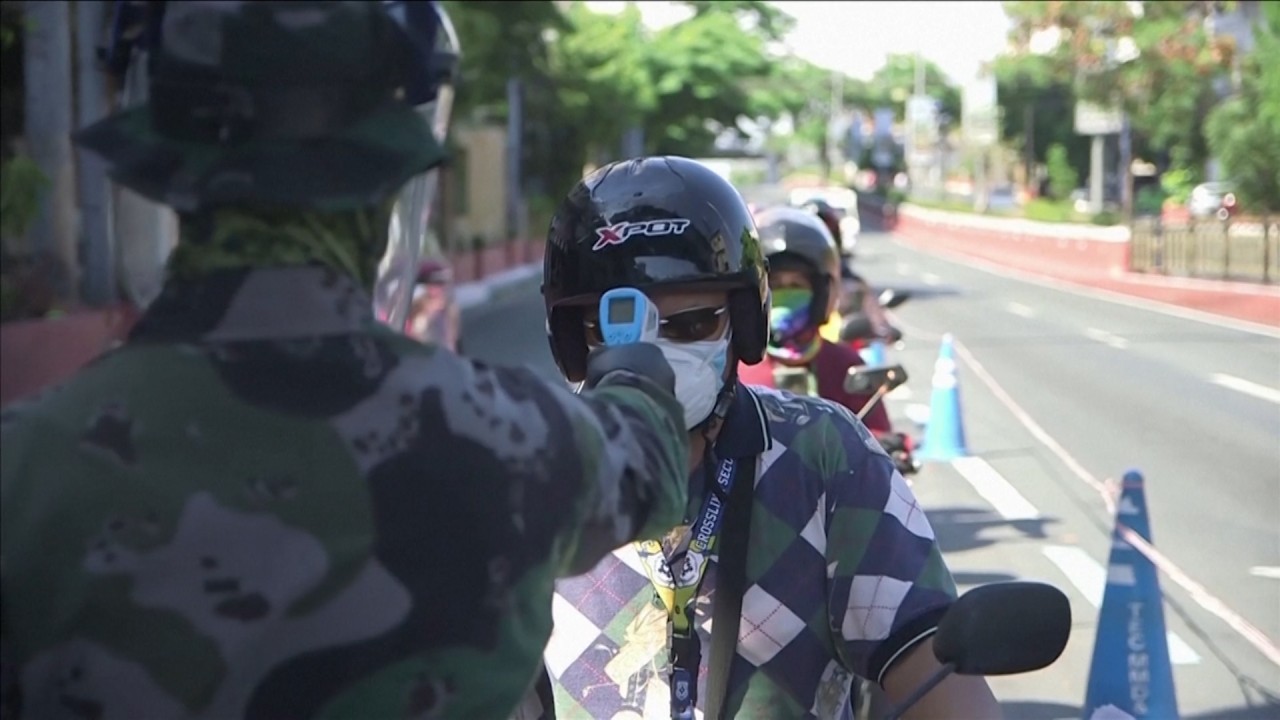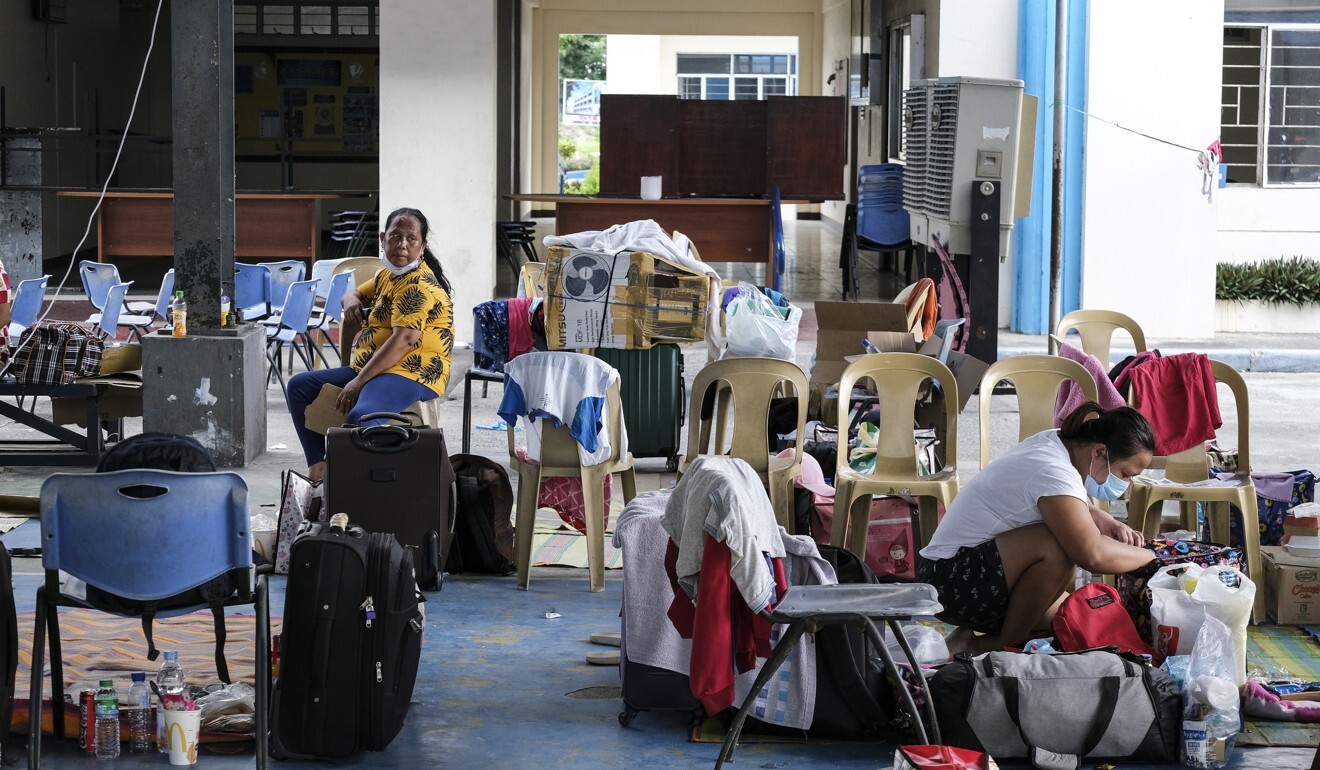
Philippines’ OFW crisis: more than 700,000 could lose their jobs due to the coronavirus by year end
- Manila is running out of money to repatriate overseas Filipino workers who have become displaced refugees due to the Covid-19 pandemic
- There are 346,555 OFWs affected by the coronavirus but only 85,334 are stranded and want to go home
Teodoro Santos* has been waiting for two months in Doha for the flight that will take him and his family home.
They have approached the Philippine Overseas Labour Office and the Overseas Workers Welfare Administration under the Department of Labour to no avail, Santos said. The embassy told them to add their names to a repatriation list, but could not say when they would be brought home.
“We were told all flights in July and August have been cancelled because of restrictions [on inbound flights] in Philippine airports,” he said.
Philippines allows thousands of OFWs trapped in quarantine limbo to go home
Long known as the fallback of the Philippine government in any economic crisis, the OFW sector is now in deep crisis for the first time since labour migration became state policy in the early 1980s. Their more than US$30 billion of annual remittances is a driver of the Philippine economy, and helps sustain millions of family members.
The Philippines has previously blamed testing bottlenecks for delays in repatriating OFWs, but the government is running out of money to help those stranded abroad – while some of those who returned have been partly blamed for the rising number of infections across the country. In May, the health officer of Cagayan de Oro City in southern Philippines told Rappler news that the spike in local cases was partly caused by returning OFWs. Local officials in the central Philippine provinces of Cebu, Iloilo and Negros Occidental also said 18 incoming OFWs had tested positive.
There are 40,336 cases in the Philippines as of Friday, while 1,280 people have died from the disease.
An electrician for 13 years in a now closed state-owned steel company in Qatar, Santos is among the more than 345,000 OFWs who have become displaced refugees since the pandemic broke out, including those who lost their jobs or cannot work due to lockdowns.

02:23
Philippines extends lockdowns to fight coronavirus, but modifies terms to revive the economy
Their numbers could swell to 700,000 by the end of the year, according to Carlo Arellano, the labour department undersecretary in charge of legal and overseas operations. His superior, labour secretary Silvestre Bello, on June 24 told Congress that Arellano’s worst-case estimate was “very possible”.
That figure would represent around 8 per cent of the more than 8.73 million Filipino nationals Bello said are working overseas. Of these, 3.39 million are legal, documented workers; 3.79 million are permanent migrant workers; and 1.55 million are working illegally.
While Bello said only 85,334 of those are considered stranded, with some 18,590 ready for repatriation and the majority “intending to stay put for now”, the Philippines’ Department of Foreign Affairs (DFA) has a different set of numbers to go with its wider global reach.
In the same meeting attended by Bello, DFA undersecretary for migrant workers Sarah Lou Arriola told lawmakers there are 88,000 distressed OFWs in Saudi Arabia alone who wanted to return home, only 6,342 of which had been repatriated – numbers she called “staggering”.
Has the Philippines contained Covid-19? Cebu City suggests otherwise
The foreign affairs and labour departments both cited the restricted number of inbound flights and the high cost of chartering planes as the main causes of the delay.
Only three repatriation flights per week, each with 350 passengers on board, are being allowed in by the Civil Aviation Authority under the Department of Transportation, Arriola said. Officials from both agencies, however, denied imposing the flight restrictions and said these came from the Philippine government’s Covid-19 task force.
At that rate, one lawmaker noted, it would take until late next year just to repatriate those from Saudi Arabia.
Arriola also pointed out that the government had brought 56,200 OFWs home as of June 25, including seafarers whose cruise ships made a stop over in Manila. As for those flown home, she said each chartered flight cost up to 13 million pesos (US$260,000), reducing the OFW fund of 1 billion pesos to just 329 million pesos. “We are afraid by August we will be in the red because the planes are very expensive to charter,” she said.

She also said the department planned to bring home 37,660 OFWs stranded in the Middle East this month, particularly in Saudi Arabia and the United Arab Emirates, if it was allowed to by the Covid-19 task force.
The task force had earlier set the restrictions on repatriation flights because the health department did not have enough coronavirus test kits, nor did it have sufficient trained technicians to conduct the tests or laboratories to process them. As a result, the first batch of OFW returnees were quarantined for more than a month in Manila before being cleared to go home.
Coronavirus threatens Philippines’ ‘economic lifeline’ of OFW remittances
Adnan Alonto, the Philippines’ ambassador to Saudi Arabia, had suggested that Manila could consider chartering cruise ships instead of planes to bring home OFWs, especially from the kingdom where “we are a bit overwhelmed”.
Alonto also confirmed that a viral video showing stranded OFWs rummaging through the rubbish bin of a mini mart was real, but he said “what [he] didn’t like” was that the video conveyed the message that the government was doing nothing for OFWs and yet the person who had posted the video on Facebook was himself a recipient of the Philippine government’s one-time cash aid of 700 riyals (US$186).
Over in Qatar, Santos still considers himself lucky since his former company has helped out with his family’s food expenses for the past three months.
He said he was willing to endure travelling home on a cruise ship and being quarantined on board. “We will obey all protocols. We just want to go home,” he said. And after the pandemic? “If they will hire me back, I’m willing to return.”
*Name changed to protect identity

